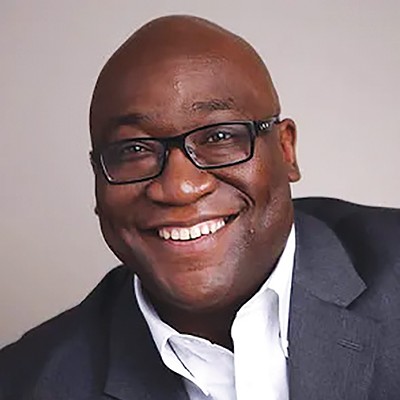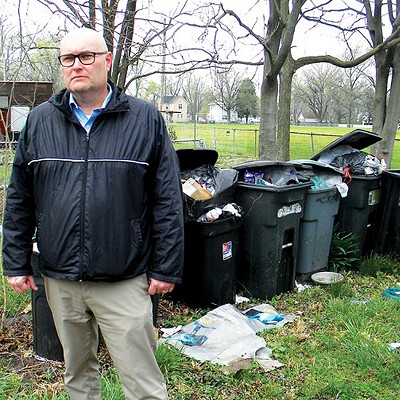William Ervin seems a decent sort.
Married with children, he lives in Laketown. The lawn is mowed, the dishes are washed, the floors are swept, the laundry is done. He goes to church and looks like the kind of guy you want for a neighbor.
Ervin acknowledges past problems with alcohol, but says he's been sober for more than four years. He's struggled with depression, maybe, he thinks, from too many hits on the head when he was an undersized linebacker in high school. Running helps, he says, as does meditation, as does smoking pot, moreso than prescription antidepressants. He says he's a daily smoker, but not on the job, and he's never had a workplace accident.
A union carpenter for 30 years, Ervin failed a random drug test last August. As a consequence, he was off work until he passed a drug test and satisfied a drug counselor that he isn't a hopeless dope fiend, which took more than a month. He's behind on house payments and sweating Christmas gifts for his kids. And he isn't alone.
I ran into Rob, not his real name, a couple months ago at a local watering hole. He's worked in the cafeteria at University of Illinois Springfield for more than five years. Last summer, he told me, he tried for a promotion that would have come with a sizeable raise. He says he would have gotten the job except, unbeknownst to him, UIS changed its drug testing policy as of July 1, making it clear that employees must pass drug tests before they can change positions, if the new position is on a list that strikes me as odd.
From executive chef to folks who wash dishes, no one who wants a job in food service at UIS can get hired, or promoted to another job preparing or serving food, without passing a drug test. Rob told me that his promotion was rescinded after he tested positive for pot, but he was allowed to keep his job, even though that position, also, is on the list. According to UIS policy, it's a matter of safety. UIS police officers must pass drug tests, but not dispatchers who answer emergency calls and give directions to responding officers. Go figure.
Like Ervin, Rob says he doesn't work while high, and who's to say otherwise? Tests don't show whether someone is under the influence. After abstaining for three days, a heroin addict or cokehead can pass a drug test, but it takes as long as 30 days for someone who smokes pot to pee clean. In Ervin's case, he was given two weeks to report for a drug test, but it wasn't long enough.
It makes sense to test for hard drugs: If you can't stop for 72 hours, you have a serious problem. But, unless there's an accident or signs of impairment, what good does it do to go after pot smokers with no evidence that they've been high at work or even in the past two weeks? "I think it discriminates against the middle class," Ervin tells me, and the UIS list, which includes more worker bees than managers, suggests he's right. Why should a prospective housekeeper have to pee in a cup while a would-be housing supervisor can smoke pot, or meth, without worry?
At UIS, 11 drug tests were administered to folks seeking employment or new positions between July 1 and mid-November, says UIS spokesman Derek Schnapp. Three came back positive, all for marijuana, with two of the three dirty samples given by employees seeking different jobs. They remained employed and were referred to an employee assistance program that's supposed to help folks with substance abuse problems.
This isn't the way the private sector does business. Michael Higgins, owner of Maldaner's restaurant, doesn't make applicants pee. "I wouldn't be able to hire anyone," he says. "What waiter or busboy or dishwasher wants to wait a month to get pot out of their system to work for me?"
This doesn't mean Higgins doesn't care. Alcohol, he says, is a bigger problem than pot, and so he keeps a breath-testing device on hand in case someone is showing signs. Drugs also aren't allowed on the job, applicants sign agreements upon employment acknowledging the rules and Higgins says he keeps a sharp eye. "I have excellent employees who work for me and have worked for me for years, but I know they do pot," Higgins says. "I don't care if you drink, I don't care if you do pot, I don't care what the hell you do. Don't bring it to work."
While UIS last summer tightened its drug testing policy, Lincoln Land Community College will stop testing most job applicants for marijuana as of Jan. 1, when recreational pot becomes legal. All applicants still will be tested for hard drugs, and pre-employment drug tests will still include pot for prospective police officers, health profession instructors and folks who want to work with preschoolers in the college's child development center.
That's a good step. Meanwhile Ervin says he's exploring whether he can continue using pot to help with his depression and still remain employed if he gets a medical marijuana card, but I wouldn't bet on it. The law that legalizes pot come Jan. 1 still allows employers to test for marijuana and sanction employees who fail. That, I suppose, is the state's brain on drugs.
Contact Bruce Rushton at





















